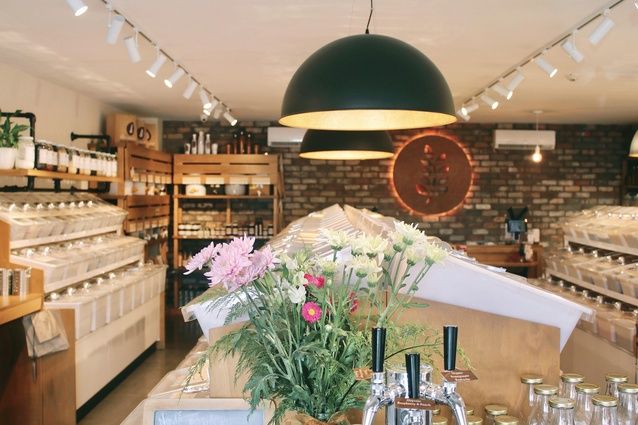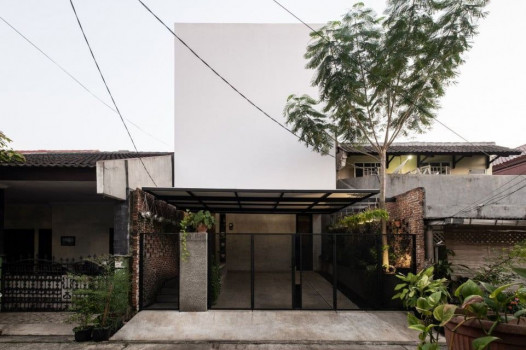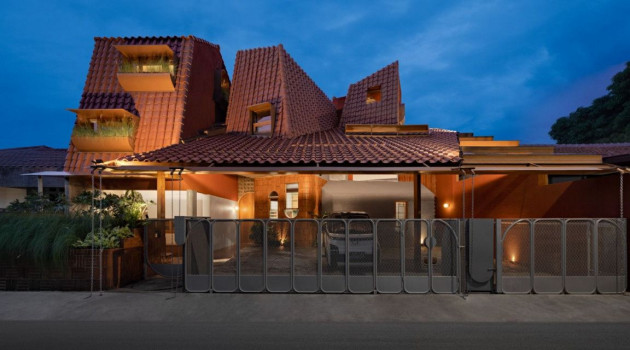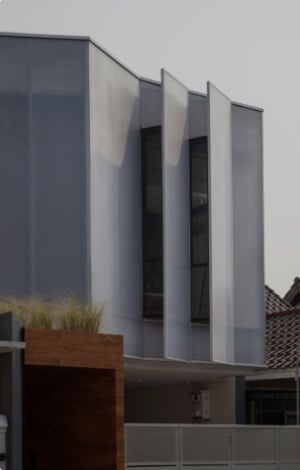Beauty in bulk



In terms of aesthetics, the bulk bin store does not have a sexy reputation. With plastic bins, metal scoops and a smattering of spilled flour on the linoleum floor, this type of utilitarian space used to be seen as a place where ruralites and environmentalists sourced their stock for the month. However, in recent years, packaging-free shopping has made a comeback and you don’t have to have dreadlocks to join the revolution. As more and more people become concerned with their waste streams, these stores and the environmentally conscious techniques to which they adhere are becoming more popular and with popularity comes design intent.
In terms of materials, colour and finish, these packaging-free havens are still fairly spartan. Ply shelving often features, showcasing plastic-free brands and smaller items. Walls tend to be clad in brick or timber. Ceilings are often high with natural or low-level lighting, giving an airy sense of well-being that is missing from your usual supermarket.
Unfortunately, it is next to impossible to be completely waste free in the consumer paradise in which we live. In an increasingly package-free world, some companies are creating products packaged in compostable wrappers or using packaging that has a lower carbon footprint than does the usual plastic bottle. These are the kinds of brand-name product that package-free stores will still stock on their shelves.
Many stock Ecostore products in bulk and consumers can refill their own bottles. Unfortunately, while the majority of its products are packaged in containers made from sugar plastic, which has a much lower carbon footprint than true plastic has (in that the sugar plants actually remove carbon from the atmosphere), the bulk containers are not. The current grade of sugar-derived Bio-HDPE is not suitable for the five- and 20-litre containers. However, Ecostore will soon be changing to a new grade that, hopefully, will allow it to use this product for its large containers. And even if the large containers are eventually taken to the recycling plant once empty, they will still have saved many individual bottles from being bought and thrown out.
Ethique is an example of a company that has eliminated waste while still maintaining a recognisable brand through its completely compostable wrappers. Ethique creates beauty products in bar form so that the consumer simply wets or rubs the bar to use the product. But how do you ensure the products stay safe on the shelf when they are not wrapped up in germ-eliminating plastic? According to the company’s website, the lack of water in most of the bars means they don’t support microbial life. Some bars use a small amount of benzyl alcohol and dehydroacetic acid to protect against fungal and bacterial contamination.
Some supermarkets are coming to the party, too, with Countdown trialling ‘nude’ fruit and vegetables in some stores (see the interview at the end of this feature). Products such as bamboo toothbrushes and stainless-steel drinking straws have also arrived on supermarket shelves, making them more accessible for the masses.
Packaging-free stores require implements: scores of scoops, tubs, pumps for liquid products and weighing stations. They represent a slower way to shop, as the counter experience is always going to take a little longer, thanks to the need for calculations. Consumer-friendly (although this is contentious), self-check-out aisles are unlikely in a packaging-free store so this is not a style of shopping for the introverted. It harks back to the days of the market, when shopping was a social event. And perhaps that is what is needed to slow down our waste streams – a more thoughtful approach to consuming.
Here are three low-waste stores that have landed on our shores in recent months, bringing beauty to bulk buying.
The Source Bulk Foods
Born in Byron Bay, The Source Bulk Foods is a bulk bin franchise success story, with more than 50 stores in Australia, plus a scattering in Singapore, the UK and, now, New Zealand. Brother and sister partners Andrea and Robert Watt own the franchise here and, so far, have opened stores in Milford, Kūmeu, Mount Maunganui, Taupō, and Christchurch.
Each The Source Bulk Foods store has a similar layout and aesthetic, with the brand’s sprig emblem in timber showcased on a recycled brick, hand-laid wall and a simple arrangement of timber shelving and bulk bins. Lighting is from industrial-style lamps and products are showcased on timber stands in the centres of the aisles. The wooden counter is reminiscent of an old storefront and staff members wear brown and tan striped aprons.
“The aim is for customers to wander through the store easily because of a simple layout,” says Andrea. “We are predominantly bulk bins but we also have herbs and spices and proteins in jars that customers can use. We have cooking oils and honey and customers’ containers can be refilled. Nut butter machines allow customers to make their own. Flour mills can be used to make their own flour… Customers can bring their own jars or bags and buy as little or as much as they like.”
Real World
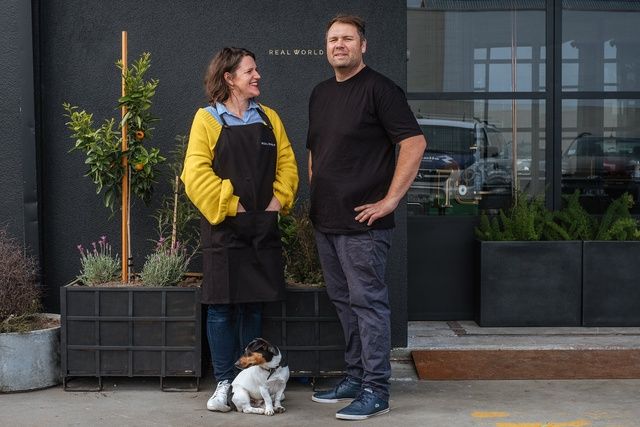
Nicola and Adam Mossman of Real World.
Stemming from a residential garage operation in Hastings, Real World has opened a bricks-and-mortar store in its home town. Founders Nicola and Adam Mossman created their range of natural and refillable skincare and homecare products in response to their own needs and soon found local success, with neighbours knocking at their doors looking to refill their dishwash or liquid soap bottles at all hours.
They moved on to supplying their products to high-end lodges such as Kāmana Lakehouse in Queenstown and Poronui in Taupō, and have now created the store and launched a website to provide to consumers. The Hastings store, hoped to be the first of many, is housed in what used to be the Herald-Tribune office on Queen Street.
“It formerly housed a colour-printing press and the advertising department, which connected via a futuristic air bridge. We have completely gutted the building and exposed a lot of the hidden gems that had been covered up over the years,” says Nicola.
“Our fit-out is very industrial and that is in keeping with the style of the building. We’ve reused and repurposed as much as we could, upcycling lights, reusing steel, cable trays, sinks, shelves and lots more! Adam has a very strong design focus and he has designed it all from scratch.”
The store makes use of Dorman Long steel, repurposed from the newspaper offices. For their refillery, the couple repurposed the large pots that store their liquid products. “It was a bit tricky working out a way to move the liquid from the top to the bottom but it made sense to figure it out and, with the help of some local engineers, we now have a plumbed, gravity-fed system that supports both the front of house where we will refill customers’ bottles and our behind-the-scenes warehouse staff filling orders.”
Be Free Grocer
Be Free Grocer in Palmerston North is especially transparent about its back-of-house waste. “Trying to eliminate as much waste as possible from our supply chain is something we are super-passionate about and it’s the reason that there are some items we simply won’t stock,” says store-owner Bronwyn Green. “Working with local growers and suppliers is something we do a lot of as this is a great way to circumvent some back-of-house waste whilst simultaneously building great relationships and community in order to establish little circular economies.”
In designing the store, Green researched the layout of other similar stores around the world and looked to its own ethos when considering materials. “We used a lot of upcycled timber for the fit-out and we also wanted to design the store in a way that ensured it was accessible for people who use mobility aids such as wheelchairs and scooters.”On the store’s Facebook page, Green presents a vlog about its back-of-house waste in which she explains that buying products in the highest single quantities possible is the best method the store has for preventing excess waste. The company also recycles its soft plastic and has plans to create its own recycling plant in-house.
Like most low-waste, refill stores, Be Free is a good deal smaller than is a supermarket. “I think the reason most supermarkets are gigantic is that packaging has allowed for a huge amount of food which we didn’t have access to 50 years ago,” says Green. “To some extent, going packaging free or using refillable/reusable packaging requires us to go back to basics: to be more in touch with what is local, seasonal and realistic. It requires us to realise that we can’t have all the things all the time.”
Supermarket Perspective
In early February, Countdown introduced Unwrapped, its new plastic-reduction trial. For 10 weeks, produce aisles in Ōrewa, Ponsonby and Manukau stores are seeing a steady stream of paper bags and a halt to their plastic counterparts. It’s a fledgling test that, on the back of customer feedback, will help steer the supermarket giant towards a more sustainable shopping experience. We spoke to Kiri Hannifin, Countdown’s General Manager of Corporate Affairs, Quality, Safety and Sustainability, to discuss the trial.
What were some of the biggest challenges you had to overcome to make this trial happen?
Kiri Hannifin (KH): Some of the key challenges were ensuring we had workable packaging alternatives for such a diverse range of produce and, also, finding alternatives to plastic produce bags for customers. However, this is a test so we didn’t expect to have answers for everything from the outset – we want, also, to be responsive to feedback and ideas for improvement throughout.
How will the trial be monitored?
KH: We’ll be monitoring a range of things including customer and team feedback, food waste (which is something we are very keen to avoid) and any impacts on store processes.
What were the main interior design elements that have needed to change prior to this trial?
KH: In the three stores, we’ve had to make a few changes to ensure we can display loose produce more easily, without packaging. These have included the new rounded shelving in our chiller units and the installation of misting units to help keep produce fresh.
Does this trial also include packaging at the supply end of things?
KH: A lot of produce will be loose but, where cardboard or paper is used as an alternative to plastic, during the test, this product will be packaged either by our suppliers at source or in our Auckland packhouse. We’ve invested heavily into working with our suppliers and introducing specially made and designed packaging for the 10-week test so removing plastic right from the start is very much front of mind for us while also still ensuring customers can find the products they love.
Do you think this package-free ethos might start influencing the rest of the supermarket? What challenges do you see that might make this difficult?
KH: Removing plastic and finding alternative packaging that meets our strict quality, food safety and environmental requirements has definitely been tricky – we don’t want to create more waste as a result, for example – however, we’re really keen for our stores and customers to test what we have available so we can gain a good understanding of what might work for the future.
This article was originally published on ArchitectureNow




 Australia
Australia
 New Zealand
New Zealand
 Philippines
Philippines
 Hongkong
Hongkong
 Singapore
Singapore
 Malaysia
Malaysia


